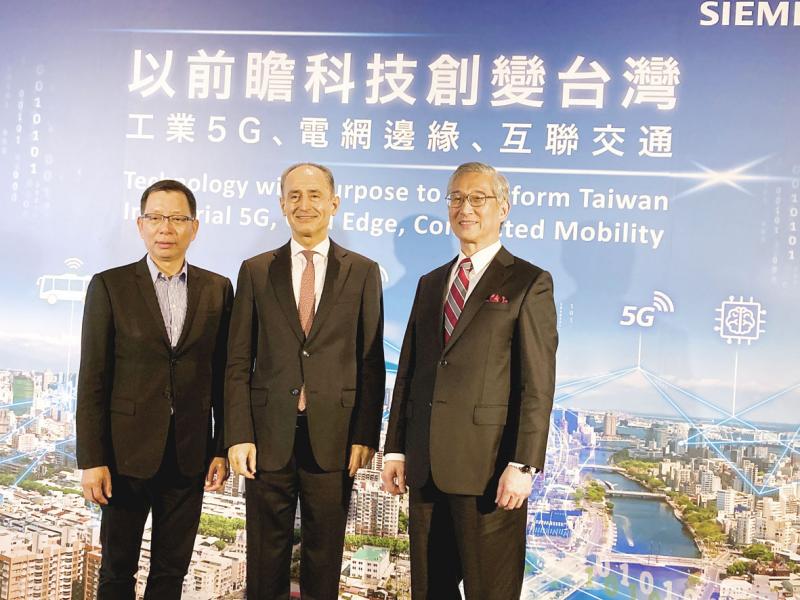Siemens Taiwan expects revenue growth to gather pace this year, benefiting from an uptrend in demand for its energy management solutions from local semiconductor companies and machine tool manufacturers, which were hit hard by the COVID-19 pandemic.
Revenue last year beat expectations as business activity returned to normal, thanks to the government’s fast and appropriate response to contain the pandemic, Siemens Taiwan president and chief executive officer Erdal Elver said on Tuesday in Taipei.
“Overall, we had a good year, backed by growth in different sectors, such as semiconductors and infrastructure,” Elver said. “We did better than planned.”

Photo: Lisa Wang, Taipei Times
Siemens Taiwan said that increased demand from local semiconductor companies helped offset declines in other sectors, mainly customers in export-oriented sectors such as machine tool companies, which slumped due to the pandemic.
Elver did not disclose the company’s growth rate last year, but the firm usually uses the nation’s economic expansion forecast as a benchmark.
“This year will be better than last year,” Elver said.
“We still benchmark Taiwan’s GDP [as our goal this year],” Elver said. “If Taiwan grows, we have to keep growing.”
GDP is forecast to expand at a faster rate of 4.64 percent this year, after posting a better-than-expected 3.11 percent growth last year, Directorate-General of Budget, Accounting and Statistics (DGBAS) data showed.
“Energy management and infrastructure should grow faster than last year. Also, industry is recovering,” Elver said. “If you look at Taiwan, [you would] see growth in semiconductors, electronic parts and goods, and industry, especially, machine tools.”
As a growing number of local firms, such as Taiwan Semiconductor Manufacturing Co (台積電), are moving to carbon neutrality and looking to renewable energy, Siemens has the technology and solutions to help them reduce emissions, Elver said.
In the infrastructure segment, Siemens last year provided Taiwan Power Co (台電) with its energy IP, a smart meter management system, with more than 3 million smart meters being installed across the nation by next year.
The smart meter management system ensures the stability of renewable energy power transmission and smart electricity transmission and distribution, the company said.
Siemens Taiwan derives its revenue from five categories: digital industries, smart infrastructure, mobility, health and energy management.

UNCERTAINTY: Innolux activated a stringent supply chain management mechanism, as it did during the COVID-19 pandemic, to ensure optimal inventory levels for customers Flat-panel display makers AUO Corp (友達) and Innolux Corp (群創) yesterday said that about 12 to 20 percent of their display business is at risk of potential US tariffs and that they would relocate production or shipment destinations to mitigate the levies’ effects. US tariffs would have a direct impact of US$200 million on AUO’s revenue, company chairman Paul Peng (彭雙浪) told reporters on the sidelines of the Touch Taiwan trade show in Taipei yesterday. That would make up about 12 percent of the company’s overall revenue. To cope with the tariff uncertainty, AUO plans to allocate its production to manufacturing facilities in

TAKING STOCK: A Taiwanese cookware firm in Vietnam urged customers to assess inventory or place orders early so shipments can reach the US while tariffs are paused Taiwanese businesses in Vietnam are exploring alternatives after the White House imposed a 46 percent import duty on Vietnamese goods, following US President Donald Trump’s announcement of “reciprocal” tariffs on the US’ trading partners. Lo Shih-liang (羅世良), chairman of Brico Industry Co (裕茂工業), a Taiwanese company that manufactures cast iron cookware and stove components in Vietnam, said that more than 40 percent of his business was tied to the US market, describing the constant US policy shifts as an emotional roller coaster. “I work during the day and stay up all night watching the news. I’ve been following US news until 3am

Taiwan will prioritize the development of silicon photonics by taking advantage of its strength in the semiconductor industry to build another shield to protect the local economy, National Development Council (NDC) Minister Paul Liu (劉鏡清) said yesterday. Speaking at a meeting of the legislature’s Economics Committee, Liu said Taiwan already has the artificial intelligence (AI) industry as a shield, after the semiconductor industry, to safeguard the country, and is looking at new unique fields to build more economic shields. While Taiwan will further strengthen its existing shields, over the longer term, the country is determined to focus on such potential segments as

COLLABORATION: Given Taiwan’s key position in global supply chains, the US firm is discussing strategies with local partners and clients to deal with global uncertainties Advanced Micro Devices Inc (AMD) yesterday said it is meeting with local ecosystem partners, including Taiwan Semiconductor Manufacturing Co (TSMC, 台積電), to discuss strategies, including long-term manufacturing, to navigate uncertainties such as US tariffs, as Taiwan occupies an important position in global supply chains. AMD chief executive officer Lisa Su (蘇姿丰) told reporters that Taiwan is an important part of the chip designer’s ecosystem and she is discussing with partners and customers in Taiwan to forge strong collaborations on different areas during this critical period. AMD has just become the first artificial-intelligence (AI) server chip customer of TSMC to utilize its advanced